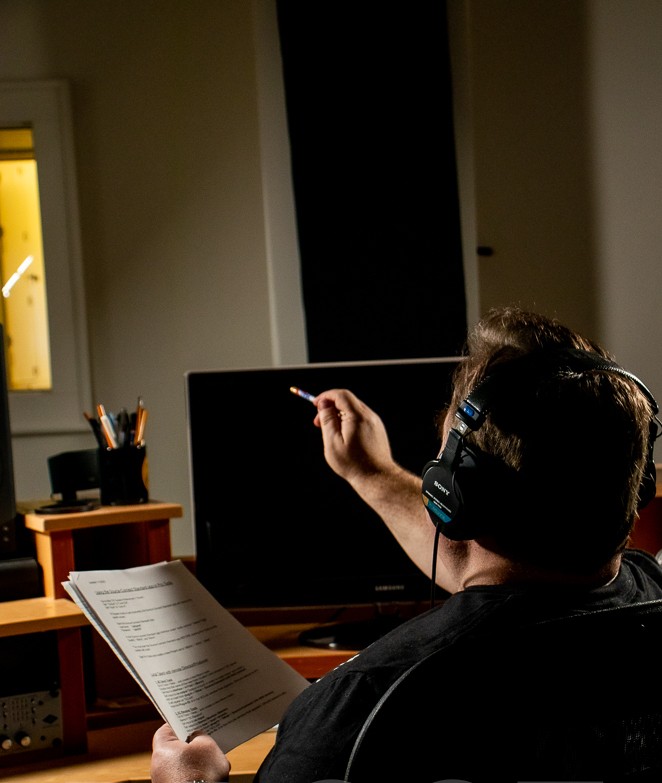Alright – so today we’ve got the honor of introducing you to Tim Powers. We think you’ll enjoy our conversation, we’ve shared it below.
Hi Tim , you’ve got such an interesting story, but before we jump into that, let’s first talk about a topic near and dear to us – generosity. We think success, happiness and wellbeing depends on authentic generosity and empathy and so we’d love to hear about how you become such a generous person – where do you think your generosity comes from?
When I started in VO, I had a very strong boost from a dear friend in the industry. Show business is very difficult to break in to. There are literally thousands of talented people out there, and not everyone can navigate the complexities of getting to the decision makers. I was very fortunate that people in positions to help me, helped me. Inspired by that, I decided I would use whatever resources I had to help those who needed it.
I call it “Passing the torch,” because a fire that was lit many years ago (the fire of generosity) was passed to me, and I feel it’s my responsibility to pass it along too.
Thanks, so before we move on maybe you can share a bit more about yourself?
Tim Powers is a seasoned voice actor with over several years of experience, lending his versatile and engaging voice to a diverse range of projects, including video games, anime, commercials, medical narrations, and more. He is widely recognized for his warm and approachable tone, and his wide range which allows him to adeptly capture a variety of characters and emotions.
Powers’ video game credits include Genshin Impact, Exo Primal from Capcom, and the Final Fantasy series of games. His commercial clients include Hiram Walker, Nectar Mattress, and Square as well as many other regional commercials in the US and Canada. He has also provided voice acting for Dateline NBC, Disney, Netflix, the St. Louis Zoo, and countless others.
In addition to voice acting, Powers is also an in-demand voice acting teacher and coach. His approachable personality, combined with his passion for his craft and his encouraging personal nature keeps his students engaged and evolving as Powers guides them through the fundamentals and advanced techniques of his art.
Powers also developed “TimProv,” an improvisational theater workshop for voice actors to stretch their imaginations and enhance their spontaneity. Tim’s decades of improvisational experience and coaching have allowed him to work with legendary theaters like The Upright Citizens Brigade and Los Angeles’ The Groundlings. Tim brings a sense of play to a very serious art. Many of Powers’ students have found TimProv to be one of the most important pieces of their development as a new actor.
Tim Powers’ dedication to his craft and his ability to seamlessly transition between diverse genres have solidified his position as a highly sought-after voice actor and voice director in the industry. His engaging voice, combined with his creative talents and insight, makes him a valuable asset to any project, ensuring that every character he embodies comes to life with authenticity and resonance.
If you had to pick three qualities that are most important to develop, which three would you say matter most?
The most important weapon in my arsenal is a sense of humor. It keeps you resilient, it prevents you from taking other people’s baggage personally, and it allows you to form a bond with people. Laughing WITH someone is a wonderful way to build an immediate bond. The good news is that you don’t have to be FUNNY and have a bunch of jokes at your disposal. Life is funny enough and in the best comedy, there is an element of truth. So, how do you develop the ability to connect and be funny and stay present in the moment? Great question. The answer, for me, was found in studying improvisational theater, which is more commonly known as “improv.” Improv is not really about being funny, or quoting movies, or playing wacky characters. It’s really about relationship, conflicts, and resolutions. A good improv scene is really a short play with two actors writing it as they go, and neither actor has control of the play, but they BOTH have control. In improv, you learn a great deal about releasing control, accepting the truth as it is established to you, and working through resolution. And, on top of that, you get to pretend to be pirates and penguins and Ronald McDonald or watever you want. How fun is that? With improv, I learned the three most important things I ever learned: How to agree, How to release control, and How to listen for details.
Thanks so much for sharing all these insights with us today. Before we go, is there a book that’s played in important role in your development?
There’s a marvelous book about the theory of improvisational theater by Charna Halpern and Del Close titled “Truth in Comedy,” and it might not resonate with everyone, especially if the reader has never performed improv, but there are so many important life lessons in that book that transcend “stage schtick.”
For example: Growing up, we’re instructed by parents and teachers and bosses to think before we speak, carefully filtering our words for the outside world. Over time, this inner censor becomes a reflex, muffling spontaneous ideas. But improv flips the script: it’s about saying the first, unfiltered thing that pops into your head. Humor, often, is found in the raw, simple truths that bubble just beneath the surface.
Improv classrooms become labs for unleashing this impulsivity. We play games where “stream of consciousness” is the name of the game, or invent nonsensical words on cue. These playful exercises loosen the grip of our internal editor, boosting creative thinking and emboldening us to speak and question more freely. And remember, there’s nothing funnier than the unvarnished truth, the uncensored gem that pops out when you finally let yourself speak without a filter.
Also, listening to what people tell you and paying attention to details is important. EVERYTHING starts with listening. Not just hearing, but diving headfirst into the world your scene partner creates. Every detail, every quirk, becomes a springboard for you to build on, twist, and turn the story into something unexpected and delightful.
Think about it: in our days of checking texts between bites of dinner or juggling calls during meetings, it’s easy to forget the power of a good listener. But in improv, listening isn’t just a courtesy, it’s a superpower. We catch every giggle, remember every throwaway line, and weave them back into the scene later, creating moments so satisfying, so personal, they leave the audience buzzing.
And guess what? This listening magic isn’t just for the stage. Have you ever felt that warm glow when someone remembers your grandma’s secret chili recipe, or the time you aced that history presentation (in that unfortunate lime green shirt)? That’s the power of truly listening, of making someone feel seen and heard. It’s a skill that makes your improv scenes shine, your friendships deeper, and your life a little richer, one story at a time.
Contact Info:
- Website: www.voiceofpowers.com
- Instagram: @timpowersvo
- Linkedin: https://www.linkedin.com/in/tim-powers-vo/
- Other: Check out my radio show M-F 4-6PM Central time on www.TheRoots.fm



Image Credits
All photos (c) Tim Powers Voice Over LLC 2024




